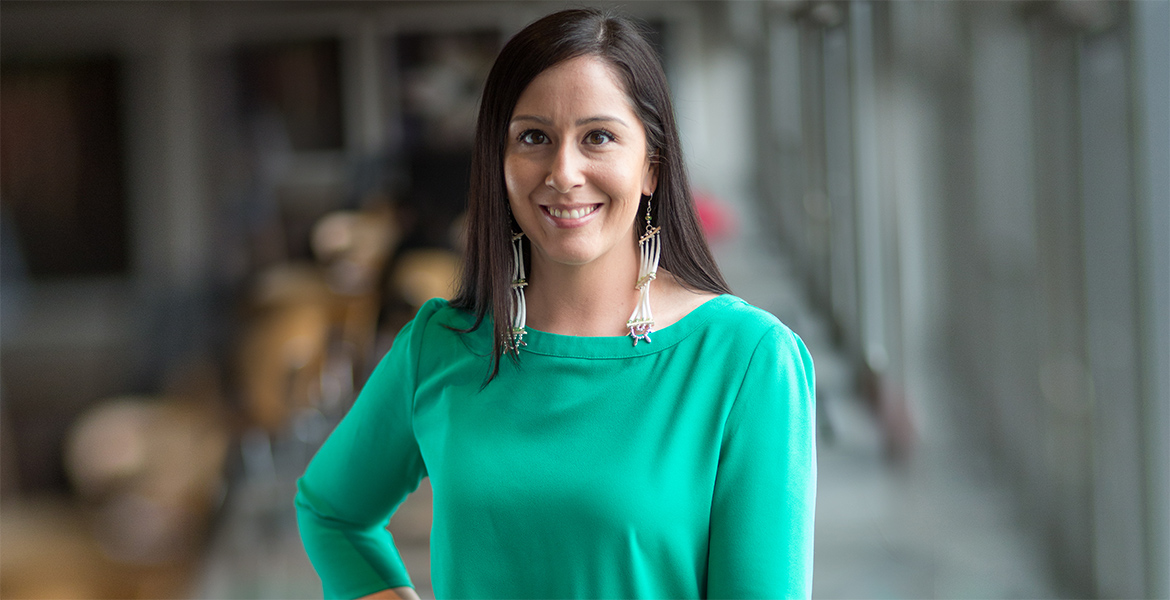
Psychology alumna researching suicide prevention in Native communities
Wednesday, April 15, 2020
Victoria O’Keefe (’12 M.S., ’16 Ph.D.) came to OSU to pursue advanced degrees in psychology. Her time here ignited her passion for research, clinic work and advocacy with indigenous communities. She is now an assistant professor at the Johns Hopkins Bloomberg School of Public Health, Department of International Health, in the Social and Behavioral Interventions Program. Read her story and learn how she is working during the pandemic.
Tell us a little about your background.
Osiyo (Hello)! I’m a Cherokee Nation citizen and Seminole Nation descendant. The maternal side of my family is from Colcord and Jay, Oklahoma, and my father’s side is from Cleveland, Ohio. I was born and raised in Cleveland but visited Oklahoma often as a child and teenager. Moving to Oklahoma to attend OSU felt like I was coming home, and I’m forever grateful for that time.
Tell us a little about what you are doing now.
I’m an assistant professor at the Johns Hopkins Bloomberg School of Public Health, Department of International Health, in the Social and Behavioral Interventions Program. I’m also an associate director at the Johns Hopkins Center for American Indian Health, which is where I conduct suicide-prevention research with Native communities. I’ve developed a graduate-level indigenous health course that I co-instruct every spring. I also advise master of public health, master of science in public health, and Ph.D. students, and provide academic services, including co-advising Native Circle – a group of Native students, faculty and staff on Johns Hopkins campuses.
Why did you decide to attend OSU?
I was fortunate to attend the American Indians Into Psychology summer research fellowship directed by Dr. John Chaney from the OSU Department of Psychology in 2009. This program allowed me to work with a Department of Psychology faculty mentor, spend time learning about tribal behavioral health clinics throughout Oklahoma and strengthen my skills to be ready to apply for clinical psychology doctoral programs. While in the AIIP program, I was exposed to strong research and training, as well as incredible support of the department. This solidified my decision to apply to OSU’s clinical psychology Ph.D. program. I was thrilled to work under the mentorship of Dr. LaRicka Wingate for both my AIIP summer and throughout my time in the Ph.D. program.
What is the most important thing you learned while you were at OSU?
The value of mentorship – I am truly grateful for the mentors who dedicated much time and energy to enrich my academic training and provided a pathway for my career. My career is also not about me as an individual but is truly about working with and for Native communities.
How did your education at OSU shape your career path?
The clinical psychology faculty at OSU provided strong training that allowed me to have a seamless transition to a clinical internship, postdoctoral clinical residency and an academic research career.
What do you remember most vividly about OSU?
Our department and doctoral program truly felt like an extension of family. The faculty and students demonstrated hard work, dedication and commitment, and support. Today, some of my best friends are the people I met at OSU. We spent a lot of time together in our classes, research and clinical training, but we also had many memorable moments attending football games, Homecoming walkaround and the annual OSU pow wow.
What are some accomplishments that you are proud of since leaving OSU?
I’m committed to increasing Native American scholars in the areas of public health and mental health. Given that I am the first Native American tenure-track assistant professor at the Johns Hopkins Bloomberg School of Public Health, Department of International Health, in the Social and Behavioral Interventions Program, I find myself with an important responsibility and opportunity to provide a pathway for other Native scholars and faculty. I believe it’s vital that Native Americans are represented in academic settings, that our peoples and voices are in classrooms, and that our health and well-being is prioritized. In line with this, I developed a graduate-level indigenous health course that I teach each spring and help co-instruct and guest lecture in our center’s summer/winter American Indian public health institute courses. I’m also helping lead an initiative to implement indigenous land recognition at the university level, as well as provide learning events for faculty, staff and administration about Indigenous peoples and issues.
What advice would you give to current students at OSU?
Take advantage of the incredible faculty mentors and intellectual resources you have at your fingertips, pass on mentorship to the next generation in your future career, and enjoy moments outside of your studies at student life or community activities or sporting events.
How is COVID-19 affecting your job?
I am fortunate and privileged to be able to work remotely from home. I’m currently teaching my “Indigenous Health” course online via Zoom, holding all meetings by phone or video conference, and working alongside our Center for American Indian Health in fundraising/projects related to COVID-19 relief and strengths-based coping resources for Native communities.
What tips do you have for people during this pandemic?
I appreciate OSU’s very own Dr. Thad Leffingwell’s tips for coping with COVID-19 and encourage everyone to check these out. I also admire the creative ways that people are connecting and supporting one another through phone, video, social media and other outlets. We can all follow guidelines about social distancing and at the same time keep socially connected!
MEDIA CONTACT: Jacob Longan | College of Arts and Sciences | 405-744-7497 | jacob.longan@okstate.edu
